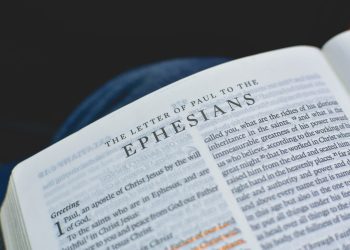Whenever the topic is adressed, this line from Job is amongst the few verses always brought up to defend the idea that the Bible describes a spinning ball earth in outer-space. However, before jumping to conclusions, it would be wise to ask ourselves, what did Job really mean by those words? What do they tell me about his worldview? What does that mean for me today?
Modern understanding
The widespread view on this verse is that “to hang on” means to suspend above, and “nothing” means no solid support as directly referring to the vacuum of space, i.e., an empty space, therefore “nothing” in that sense. The idea thus, allegedly, would be that the earth hangs in outer-space with “nothing” to support it under. We shall further see if this interpretation stands up to biblical scrutiny.
Definition and usage
To hang upon in Hebrew is formed of the verb talah which means “to hang”1Talah, “to hang” https://biblehub.com/hebrew/8518.htm and the preposition al which means “upon”2Al, “upon” https://biblehub.com/hebrew/5921.htm. Let’s see how put together, these words are used in the Bible.
See the verses below:
| Genesis 40:19 | In three days Pharaoh will lift up your head—from you!—and hang you on a tree. And the birds will eat the flesh from you.” |
| Deuteronomy 21:22 | “And if a man has committed a crime punishable by death and he is put to death, and you hang him on a tree, |
| Joshua 8:29 | And he hanged the king of Ai on a tree until evening. And at sunset Joshua commanded, and they took his body down from the tree and threw it at the entrance of the gate of the city and raised over it a great heap of stones, which stands there to this day. |
| Joshua 10:26 | And afterward Joshua struck them and put them to death, and he hanged them on five trees. And they hung on the trees until evening. |
| 2 Samuel 18:10 | And a certain man saw it and told Joab, “Behold, I saw Absalom hanging in an oak.” |
| Esther 2:23 | When the affair was investigated and found to be so, the men were both hanged on the gallows. And it was recorded in the book of the chronicles in the presence of the king. |
| Esther 5:14 | Then his wife Zeresh and all his friends said to him, “Let a gallows fifty cubits high be made, and in the morning tell the king to have Mordecai hanged upon it. Then go joyfully with the king to the feast.” This idea pleased Haman, and he had the gallows made. |
| Esther 6:4 | And the king said, “Who is in the court?” Now Haman had just entered the outer court of the king’s palace to speak to the king about having Mordecai hanged on the gallows that he had prepared for him. |
| Esther 7:9 | Then Harbona, one of the eunuchs in attendance on the king, said, “Moreover, the gallows that Haman has prepared for Mordecai, whose word saved the king, is standing at Haman’s house, fifty cubits high.” And the king said, “Hang him on that.” |
| Esther 7:10 | So they hanged Haman on the gallows that he had prepared for Mordecai. Then the wrath of the king abated. |
| Esther 8:7 | Then King Ahasuerus said to Queen Esther and to Mordecai the Jew, “Behold, I have given Esther the house of Haman, and they have hanged him on the gallows, because he intended to lay hands on the Jews. |
| Esther 9:13 | And Esther said, “If it please the king, let the Jews who are in Susa be allowed tomorrow also to do according to this day’s edict. And let the ten sons of Haman be hanged on the gallows.” |
| Esther 9:25 | But when it came before the king, he gave orders in writing that his evil plan that he had devised against the Jews should return on his own head, and that he and his sons should be hanged on the gallows. |
| Psalm 137:2 | On the willows there we hung up our lyres. |
| Songs 4:4 | Your neck is like the tower of David, built in rows of stone; on it hang a thousand shields, all of them shields of warriors. |
| Isaiah 22:24 | And they will hang on him the whole honor of his father’s house, the offspring and issue, every small vessel, from the cups to all the flagons. |
Now, let’s examine some of these verses with the scope of to suspend above of the globe earth proponents.
We’re told that Joshua hanged the king of Ai and the five kings of the Amorites on trees. Given that “to hang on” means to suspend above, what exactly did those guys die from? Floating up there above the trees? And what did Joshua’s expect exactly? To wait for a strong wind to bring them down and have them die upon reaching the ground? Or to wait for enough birds to crash into them until they can no longer take it, and give up the spirit at last? Same for Pharaoh’s baker, whose beheaded corpse was to be hanged on a tree. Was it just floating above some tree? The same is also puzzling regarding God’s law on crimes punishable by death: the corpse has to be brought down and buried before the night. Wait, a corpse? Is floating between earth and sky supposed to somehow make you die?
What about Joab, Israel’s army commander, who killed David’s son Absalom as he was hanging on a terebinth. How would he possibly do so, if Absalom is floating above the tree’s canopy and Joab is under. Is Absalom Superman? Have you ever seen a terebinth? Its thickness and multiplicity of its branches makes it difficult to see and aim through.3 See: https://en.wikipedia.org/wiki/Pistacia_terebinthus Where would Joab know where and how to strike? Yet, we’re told that he struck him three times – not once, but thrice, and with spears – not swords during close combat, and right in the heart. I knew Joab was a skilled warrior, but to the extent of hitting three bullseye shots through foliage and against a superpowered enemy? Is Joab Batman? Then, we’re told that ten of Joab’s soldiers also struck him and finished him.42 Samuel 18:15 Is this some kind of 10th century B.C. Hollywood superhero theatre?
After being found guilty of plotting against innocent lives, Esther tells us, Haman got sentenced by Xerxes, the King of Persia, to be hanged on gallows; and his ten sons with him. Although the referred method is not specified in the text, the Persians had several means of execution using wood, like impalement, crucifixion or quartering.5See paragraphs 7, 10 and 12,13,14 https://historycollection.com/18-examples-of-crime-and-punishment-in-the-ancient-persian-empire/ Luckily enough for Haman, because “to hang on” simply means to suspend above, him and his ten sons were just put to float above whatever the gallows was and left there, until they somehow finally died. Died of what? Well, died of just being there. Pretty cruel, if you ask me. Nothing like what we’re used to with Persia, isn’t it?
Do you think that the musicians the text is talking about in Psalm 137 are throwing their instruments up in the air, for them to float above the tree? I didn’t know the captivity in Babylon was so bad that the people developed compulsive behavior, such as throwing your musical instrument high above the ground and having it float up there, whenever somebody asks you to play something and you don’t want to. Is this some sort of ritual, or a custom we’ve been missing? We may never know.
When Solomon is comparing his lover’s neck to a mighty tower from which warrior shields hang, do you think he is saying that the shields are floating above the tower? Rather, is he not simply comparing her neck to a straight and strong tower, with shields all around, exposed to the sight of everybody, for everybody to acknowledge the beauty and glory of said tower? Which one is it? Which one makes sense?
What kind of world is this, where corpses float freely, people have superhuman powers, and so do objects. Is Middle East some sort of enchanted place where superheroes, magic and the Star Wars’ force meet up together?
As you may figure out, “to hang on” doesn’t refer to what an object is suspended above, but to what it is attached to or suspended to, i.e., to what it hangs from; whether it be Pharaoh’s baker, someone punishable by death, the king of Ai, the five kings of the Amorites or Absalom that are hanged on trees, or Haman and his ten sons that are hanged on gallows, the Israelites that hang their musical instruments on a poplar, Solomon comparing his lover’s neck to a tower from which hang on shields; or, figuratively, King Hezekiah’s palace administrator, Eliakim, being given rule, honor and glory by God.
If one wants to keep believing that the expression refers to some idea of being suspended above something else, that person will have a hard time accounting for the all the instances in which it is used in the exact same manner, entering a world where Disney magic makes impossible trickery the norm.
To the point
As shown before, “to hang upon” or to hang on doesn’t in any case, way, shape or form, refer to what an object is above. If the earth hangs on nothing, it doesn’t mean that it is suspended above “nothing”, and with nothing assumed referring to outer-space, that it is above or in outer-space; but that it is attached to nothing from above. The inconsistency is this, that the globe earth believers interpret the verse through the lens of a presupposed globe: they assume a globe in outer-space and then derive the meaning of “to hang on” and “nothing” from that assumption, which begs the question of how do they know that Scripture teaches earth is a spinning globe in outer-space?
Following is a commentary that sums up the situation pretty well:
To hang “upon” is to hang from; the representation, therefore, is that the earth is suspended, attached to nothing above it which sustains its weight, not that it hangs with no support under it. The representation obviously is the other side of that in reference to “the north” in the first clause. The eye was impressed by the great void between earth and the starry heavens. The latter were stretched over this abyss, upheld by nothing under them, a striking instance of the power of God; while the broad face of the earth lay firm below this void though hung from no support that upheld it. The idea of modern astronomy that the earth is a ball, poised free on all sides in space, is of course not found here.
Andrew B. Davidson, The Cambridge Bible for Schools and Colleges: The Book of Job, 1889, p. 184
–
Let’s pause and think for a minute here. Why do we hang things on other things? What is the purpose of doing so? The answer is simple: so that it doesn’t fall.
See, if the king of Ai, the five kings of the Amorites, Absalom, Haman and his tens sons, lyres and shields are not attached to something, they will fall through the air, to the ground, and therefore will not be hanged anymore. So the reason they are hanged is for them not to fall through the air, for whatever purpose that is.
Now, this raises the question of why would the earth need to be attached to something? What would it fall through if it wasn’t hanged?
God’s majestic might
Inspired by the Spirit, David tells us that to God belongs the earth and all that is in it for he founded it upon the seas and established it upon the waters. Likewise, we’re told that he spreads out the earth above the waters. God also tells us on mount Sinai that we shall not make any idol of what is in heaven above, or on the earth beneath or in the waters that are below the earth. There is water below the earth, and water around the earth. Water encompasses the earth from all sides. The earth is set upon water, it floats on it, stands out of it and inside it.
Do you now get Job’s amazement, what he is baffled by? How does something as massive as the earth doesn’t sink, with all its inhabitants, into the deep upon which it is set? How have we not all drowned yet? We certainly should, given that it is not hanging on anything. What keeps the earth afloat? The answer to that question is not what, but who. God hangs the earth upon nothing. He does it. The only reason for which we are not drowning right now as the earth sinks through the deep is because God holds it firm in place. He formed it, he founded it, he established it, and he makes sure it doesn’t move one inch from where he wants it to be, and that is, both in and out of the waters. When you’re told that Jesus sustains all things by his powerful word, would you think of such a marvelous wonder as this? The earth you’re standing on as you read these lines is held afloat by Jesus, and that on a daily basis since day 3. Who is able to do the same? Which god? Whose graven image? Is there anyone able to demonstrate such power, other than the creator himself?
People deny the one who created this earth they are on, and yet are kept alive by his unfathomable patience. We as humans blaspheme God all day long, yet he doesn’t move his hands one inch, for us not to sink and drown. I think this just shows how loving and merciful God is. That’s Job’s God, and mine as well. Is that yours?








Well Said Sam.